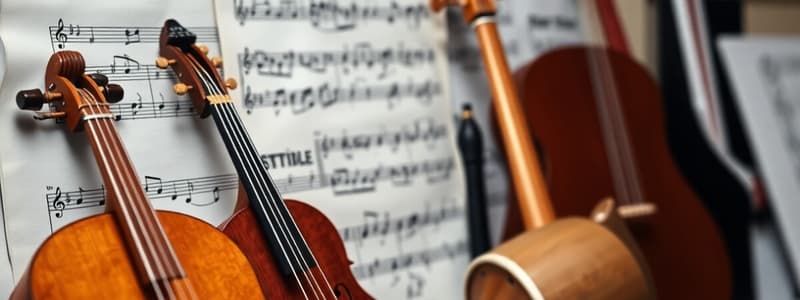Podcast
Questions and Answers
Apa yang dimaksud dengan musik vokal?
Apa yang dimaksud dengan musik vokal?
- Musik yang ditampilkan tanpa instrumen.
- Musik yang menggunakan suara manusia sebagai instrumen utama. (correct)
- Musik yang diciptakan menggunakan berbagai alat musik.
- Musik yang hanya terdapat dalam bentuk opera.
Apa yang menjadi fokus utama dalam teknik vokal?
Apa yang menjadi fokus utama dalam teknik vokal?
- Pengendalian napas, produksi nada, dan artikulasi. (correct)
- Komposisi musik.
- Mempelajari sejarah musik.
- Penggunaan instrumen yang beragam.
Apa saja jenis instrumen musik yang ada?
Apa saja jenis instrumen musik yang ada?
- Hanya alat musik petik.
- Hanya alat musik klasik.
- Beragam alat musik dari berbagai keluarganya. (correct)
- Alat musik tiup dan alat musik perkusi saja.
Apa peran instrumen musik dalam budaya?
Apa peran instrumen musik dalam budaya?
Mengapa penting untuk memahami notasi musik saat memainkan alat musik?
Mengapa penting untuk memahami notasi musik saat memainkan alat musik?
Apa yang dapat ditambahkan vokal pada musik instrumental?
Apa yang dapat ditambahkan vokal pada musik instrumental?
Apa yang membedakan alat musik dari musik vokal?
Apa yang membedakan alat musik dari musik vokal?
Apa yang mencirikan keluarga alat musik gesek?
Apa yang mencirikan keluarga alat musik gesek?
Apa yang menjadi karakteristik umum dari musik vokal di berbagai budaya?
Apa yang menjadi karakteristik umum dari musik vokal di berbagai budaya?
Apa yang dimaksud dengan 'a cappella' dalam musik vokal?
Apa yang dimaksud dengan 'a cappella' dalam musik vokal?
Flashcards
Musik vokal
Musik vokal
Musik yang menggunakan suara manusia sebagai alat musik utamanya.
Musik instrumental
Musik instrumental
Musik yang menggunakan berbagai alat musik untuk menghasilkan suara dan menciptakan musik.
Jenis alat musik
Jenis alat musik
Pengelompokan alat musik berdasarkan cara pembuatan dan cara menghasilkan suara.
Jangkauan vokal
Jangkauan vokal
Signup and view all the flashcards
Teknik vokal
Teknik vokal
Signup and view all the flashcards
A Cappella
A Cappella
Signup and view all the flashcards
Interaksi Musik Vokal dan Instrumental
Interaksi Musik Vokal dan Instrumental
Signup and view all the flashcards
Genre musik
Genre musik
Signup and view all the flashcards
Alat musik gesek
Alat musik gesek
Signup and view all the flashcards
Alat musik tiup
Alat musik tiup
Signup and view all the flashcards
Study Notes
Vocal Music
- Vocal music encompasses music created using the human voice as the primary instrument.
- It spans diverse genres, including opera, choral music, folk songs, and various styles of popular music.
- Vocal ranges vary greatly, from the low bass ranges to the high soprano ranges.
- Vocal techniques, such as breath control, tone production, and articulation, are crucial in achieving musical expression.
- Vocal music has a rich history, evolving through different cultural and historical periods.
- Different cultures have unique vocal traditions with distinct styles, techniques, and repertoires.
- Vocal music can be accompanied by instruments, or performed a cappella (without instrumental accompaniment).
- Vocal music often tells stories, expresses emotions, or conveys cultural narratives.
Musical Instrument Music
- Musical instrument music utilizes various instruments to produce sound and create music.
- Instruments vary significantly in their construction, materials, and sound production mechanisms.
- Instruments can be categorized into different families based on their construction and how they create sound. These families can include stringed instruments, woodwind instruments, brass instruments, and percussion instruments.
- Each instrument family has its own unique characteristics and timbres.
- Musical instrument music also comes in various styles and genres, including classical, jazz, rock, pop, and many others.
- The development of musical instruments has reflected the evolution of technology and cultural exchange across different civilizations throughout history. Musical instruments and the music they produce have a role in cultural and social expression.
- The use of musical instruments often enhances the emotional impact and expressive possibilities of music.
- Instruments can be played individually or in ensembles of different sizes, ranging from solo performances to large orchestras or bands.
- Composers frequently write pieces specifically suited for particular instruments, requiring specific techniques for optimal performance.
- The ability to read and interpret musical notation is crucial for playing musical instruments and understanding musical scores.
- The combination of different instruments creates diverse textures and harmonies, enriching the listening experience.
Vocal and Instrumental Music Interaction
- Vocal and instrumental music frequently intertwine, enhancing the expressive richness and complexity of musical works.
- Vocalists can perform with instrumental accompaniment, creating a dynamic blend of sounds.
- Instrumental music often accompanies vocal music, either supporting the melody, harmonizing the vocals, or creating a separate but complementary musical layer.
- Songs, operas, and other forms usually combine both vocal and instrumental parts.
- Different instruments can be utilized to create different moods, atmospheres, and textures supporting vocals, creating a rich sonic tapestry.
- Techniques and styles in both vocal and instrumental music have influenced and evolved alongside each other.
Studying That Suits You
Use AI to generate personalized quizzes and flashcards to suit your learning preferences.




